Dive into this engaging Bible study to uncover the timeless lessons embedded in the story of Adam and Eve.
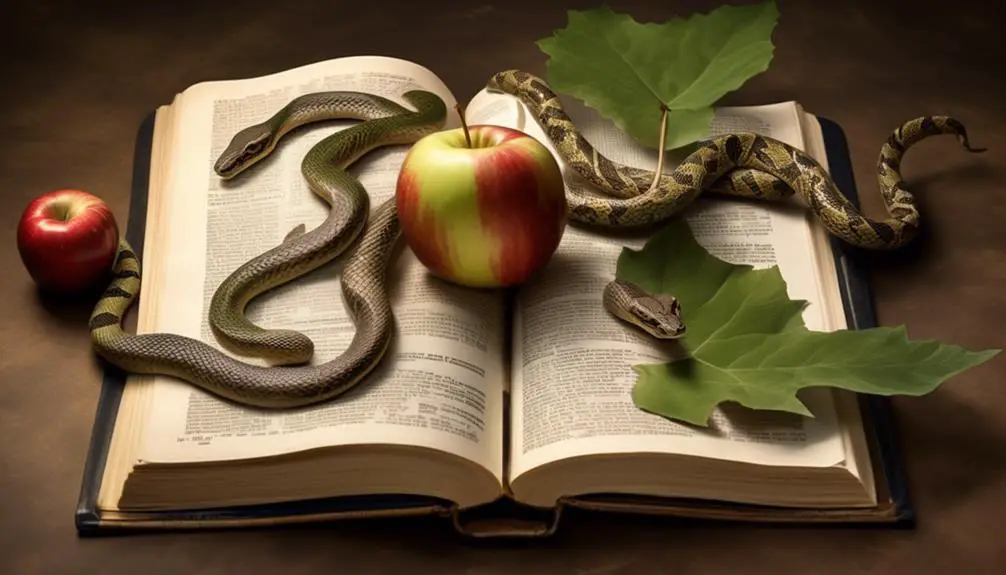
Bible Study – Learning About Adam and Eve
Imagine Adam and Eve, standing in the Garden of Eden, checking their Apple iPhones for the latest weather forecast. Sounds odd, doesn't it?
Yet, as we embark on this exploration of the Bible's first two humans, you'll find that their story, despite its ancient setting, bears relevance to our modern lives in surprising ways.
We'll examine their creation, the infamous act of disobedience, the subsequent punishment, and their enduring legacy. But more than just recounting these events, we'll aim to decipher their implications, inviting you to reflect on what lessons you can glean from this primal narrative.
So hang tight, because we're just getting started.
Key Takeaways
- The creation of Adam and Eve in the 'Divine Image' contributes to ethical and moral constructs.
- The act of disobedience in the Garden of Eden shapes human understanding of sin, free will, and moral responsibility.
- The punishment and expulsion from Eden underscore the severity of Adam and Eve's actions, but also offer opportunities for redemption and demonstrate divine love.
- The legacy of Adam and Eve has shaped collective conscience and morality, challenging the human condition and our quest for understanding and redemption.
The Creation of Adam and Eve
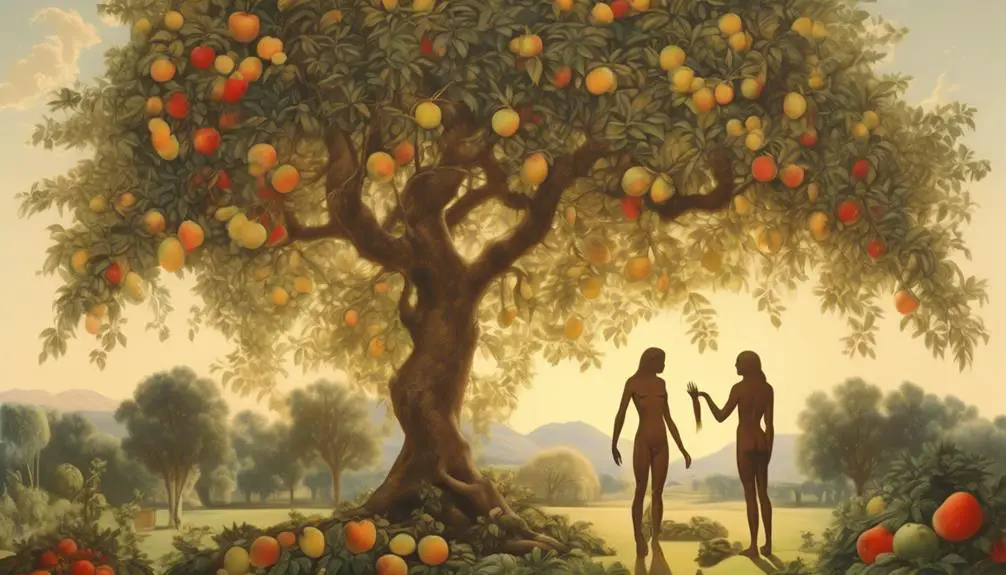
Diving into the genesis of humanity, you'll find the intriguing narrative of Adam and Eve's creation, a seminal event deeply woven into the tapestry of Abrahamic religions. According to the Genesis account, both were created in the 'Divine Image', a phrase that has elicited profound theological and philosophical debates. The concept of the 'Divine Image' suggests an inherent dignity and worth bestowed upon humanity, contributing to the shaping of ethical and moral constructs within these religious traditions.
The creation narrative also lays the groundwork for the understanding of gender roles. Adam, fashioned from the dust, is first imbued with life. Eve, however, is created from Adam's rib, suggesting a shared essence, yet the narrative has been interpreted in ways that have imposed hierarchical structures. In particular, Eve's creation from Adam's body has often been used to justify her subordinate role.
However, an analytical reading of the text challenges such simplistic interpretations. The creation 'in the Divine Image' indicates a shared divine likeness, which could suggest an intended equality rather than hierarchy. Furthermore, the Hebrew term 'Ezer', used for Eve, meaning 'helper' or 'companion', doesn't denote inferiority but rather implies a partnership.
Disobedience in the Garden of Eden
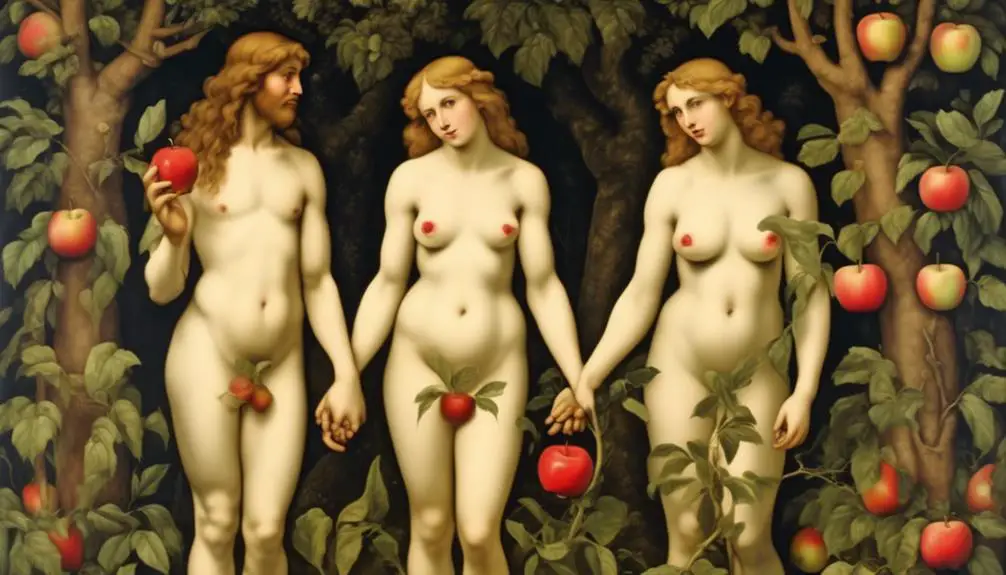
Moving from the creation of Adam and Eve, we now encounter their defining moment of disobedience in the Garden of Eden, a pivotal episode that has shaped human understanding of sin, free will, and moral responsibility. This disobedience, catalyzed by the Serpent's Influence, marked the genesis of humanity's complex dance with moral choice.
The Serpent's Influence is a key element in this narrative. The serpent, a crafty creature, manipulated Eve by questioning God's command not to eat from the Tree of Knowledge. His cunning words stirred in Eve a curiosity and desire that ultimately led to the act of disobedience. The Serpent's Influence here symbolizes the external temptations that often challenge our moral compass.
On the other hand, the Free Will Consequences are a critical aspect that needs to be understood. After succumbing to the Serpent's Influence, Adam and Eve made a conscious choice to eat the forbidden fruit, exercising their free will. Yet, the consequences were immediate and severe. They experienced shame, fear, and were banished from the Garden of Eden – the very embodiment of paradise.
This narrative teaches us that free will, while a divine gift, comes with immense responsibility. The choices you make, influenced or not, have consequences. It's a stark reminder that you're tasked with the duty of discerning right from wrong and bearing the results of your actions.
Punishment and Expulsion
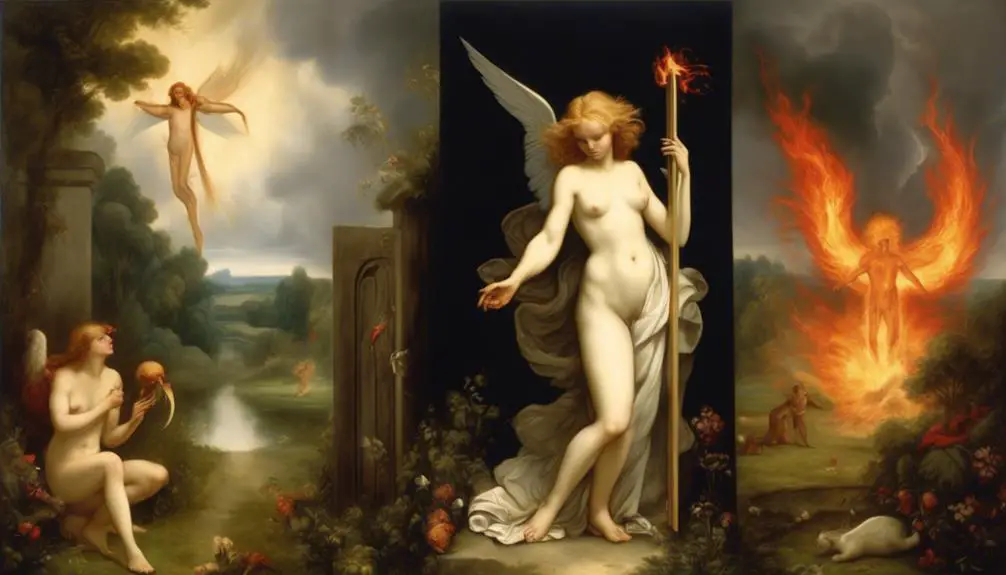
In the wake of their monumental error, Adam and Eve faced divine punishment and expulsion from Eden, a consequence that underscores the severity of their actions. This wasn't a mere slap on the wrist; it was a drastic, life-altering repercussion that illustrates the concept of Divine Justice in the biblical narrative. God, in his omniscience, deemed it necessary to cast out the first humans, altering their lives and the course of humanity forever. This was a moment of profound gravity, demonstrating the intense ramifications of disobedience.
However, it's important to not merely view this event as an act of divine retribution. Analyzing this narrative, you'll see the hint of Redemption Potential woven into the fabric of the story. Yes, Adam and Eve were expelled, but God didn't abandon them to a hopeless existence. He provided them with tools for survival, a mark of His continued care despite their transgressions.
Furthermore, their expulsion from Eden wasn't the end of their interaction with God. He remained a constant in their lives, providing guidance and opportunities for redemption. In essence, the punishment served not only as a consequence but also as a catalyst for spiritual growth and transformation.
Understanding the story of Adam and Eve's punishment and expulsion helps you appreciate the complexity of Divine Justice. It's not simply about retribution; it's also about redemption. It demonstrates God's unfathomable wisdom, balancing punishment with mercy, and underscores the profound potential for redemption even after grave errors. It's a story of consequences, but also hope and divine love.
The Legacy of Adam and Eve
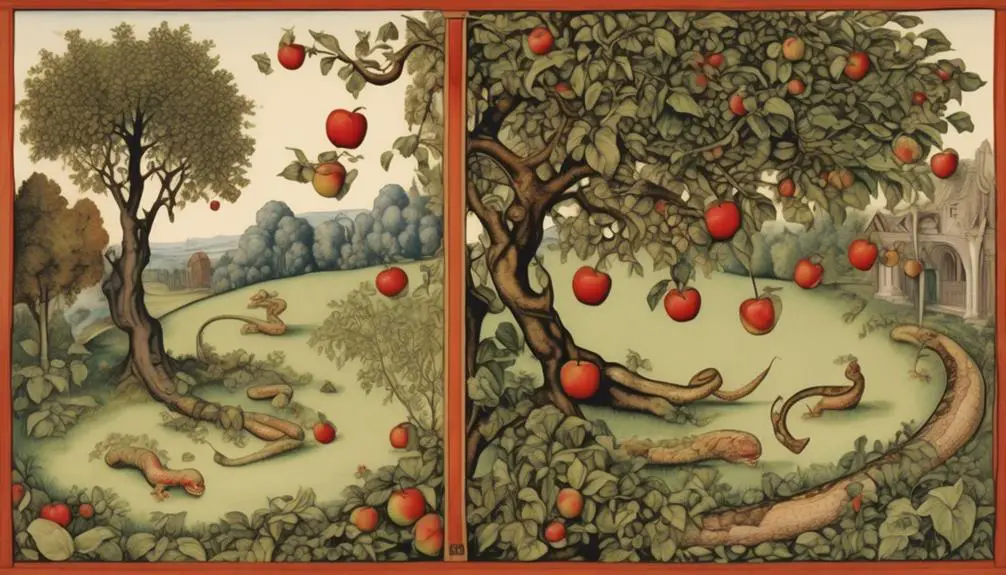
While the tale of Adam and Eve's expulsion from Eden provides a lens into the nature of Divine Justice, their legacy – the long-lasting impact they've left on humanity and religious thought – merits equal, if not greater, exploration.
The concept of Original Sin, born from their transgression and deemed a universal genetic inheritance, is a cornerstone of Christian theology.
The Original Sin, according to religious doctrine, isn't simply a historical event, but an inherited state of sinfulness from which no human being is exempt. Just as you inherit physical traits from your ancestors, the Original Sin posits that you also inherit spiritual flaw. This concept has shaped the way people perceive themselves and their inherent worth.
This inherited sin is often seen as the root of all human suffering and wrongdoing, underscoring our need for salvation and grace. It's a complex, layered idea that's been the focus of theological debates for centuries. Some see it as a testament to humanity's innate weakness, while others view it as a call to strive for moral and spiritual improvement.
The legacy of Adam and Eve, therefore, is more than just a tale of disobedience. It's a narrative that has shaped the collective conscience and morality of numerous societies throughout history. It's a story that speaks to the human condition, our weaknesses, and our ceaseless quest for understanding and redemption.
Their legacy, imbued with complexities and contradictions, continues to resonate with us, challenging us to grapple with the profound themes of sin, free will, and divine justice.
Interpreting the Adam and Eve Story
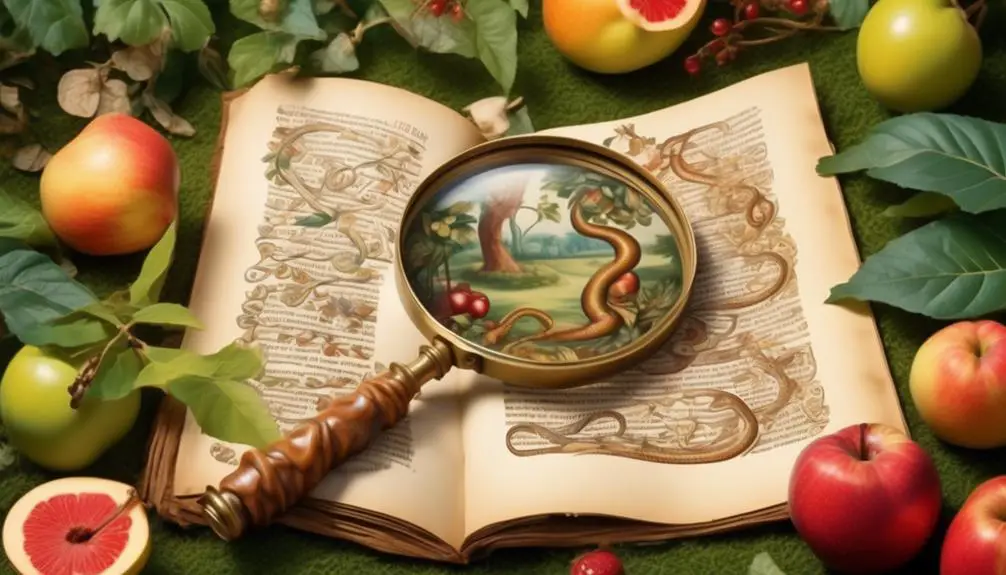
Yet, the legacy of Adam and Eve isn't just in the theological implications of Original Sin, but also in the varied interpretations of their story that offer us different perspectives into human nature and morality. You're invited to delve into these interpretations, each offering a unique lens through which to view this seminal biblical narrative.
A popular angle is the symbolic interpretation of Adam and Eve's story. Here, Adam and Eve aren't individuals but representatives of humanity as a whole. Their experiences in Eden symbolize the trials and triumphs that we, as a species, face in our journey of self-awareness and moral understanding. The forbidden fruit, then, becomes a metaphor for knowledge and its accompanying loss of innocence, rather than a literal object of temptation.
The narrative also offers profound insights into gender roles. In traditional interpretations, Eve's role has often been seen as secondary and subservient to Adam's, reflecting patriarchal norms prevalent during the Bible's composition. However, some modern interpretations challenge this view. They highlight Eve's active role in seeking knowledge, portraying her not as a passive accomplice to Adam, but as a complex character grappling with her curiosity, ambition, and the consequences of her actions.
In understanding these interpretations, you're not only gaining insights into the story of Adam and Eve, but also engaging in a broader discourse on human nature, morality, and societal structures. As you delve deeper, you're encouraged to form your own interpretations, enriching your understanding of this enduring narrative. Remember, biblical texts like these are as much mirrors reflecting our own realities, as they're windows into the past.
Conclusion
In revisiting Adam and Eve's narrative, you've explored their creation, disobedience, punishment, and legacy.
This story offers profound lessons on human nature and divine justice.
Interpreting it isn't just about historical or literal truth, but about the deeper wisdom it imparts.
Remember, it's our task to continually seek understanding, engaging with these ancient stories to uncover the timeless truths they hold.
This exploration of Adam and Eve is just one step in that lifelong journey.



Sign up